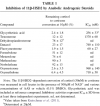Just a few examples, in his cardarine article he writes:
"Via activating PPARδ, the liver switches its energy source from glucose to fatty acids, which can in turn reduce blood sugar levels [R]."
The reference being this study:
The metabolic syndrome is a collection of obesity-related disorders. The peroxisome proliferator-activated receptors (PPARs) regulate transcription in response to fatty acids and, as such, are potential therapeutic targets for these diseases. We ...

www.ncbi.nlm.nih.gov
In this study they examined the expression of several genes and blood measures in PPARδ knockout mice, db/db mice (a strain of diabetic mice) and wild-type in response to GW501516.
But does this study support what he says?
They find:
"Molecular and functional analyses suggest that PPARδ activation reduces hepatic glucose output by increasing glycolysis and the pentose phosphate shunt and promoting fatty acid synthesis in the liver."
Surrogates of
hepatic fatty acid oxidation were not measured in this study.
While it's true that PPARδ activation induces hepatic fatty acid oxidation, his reference doesn't demonstrate it, and I don't think it's the reason why it has the potential to decrease blood glucose levels. (Mind you: blood glucose did not significantly decrease compared to controls in the clinical trials)
The next sentence: "This in turn upregulates the body's expression of proteins involved in energy expenditure, improves insulin sensitivity and body composition, which can lower the overall incidence of type II diabetes and cardiovascular disease [R, R]."
Neither of these studies subscribe to the claim that an increase in hepatic fatty oxidation leads to the effects he describes.
He's also misleading in representing the clinical trial results imo, he writes about this trial
Triglyceride:high-density lipoprotein cholesterol effects in healthy subjects administered a peroxisome proliferator activated receptor delta agonist - PubMed:
"Cardarine significantly improved HDL Cholesterol levels and reduced Triglycerides [R]."
Triglycerides only showed a statistically significant within-group decrease, it showed no significant change compared to placebo.
Similarly he writes: "Lipolytic activity was gauged to assess the efficacy of Cardarine relative to placebo and the data revealed that the placebo group's Triglyceride levels went up significantly from high-fat meals, and the 2.5 mg and 10 mg treated groups both respectively lowered Triglyceride levels, even in the presence of the fat dense meals."
It would be honest to mention that the decrease in the 2.5 mg group was not statistically significant compared to the placebo group.
About a second clinical trial he writes:
"Treatment with Cardarine showed statistically significant reductions in fasting plasma triglycerides, apolipoprotein B, LDL cholesterol, and insulin [R]."
This is imo also misleading, as all these changes were only statistically significant in a within-group comparison. Compared to placebo, none of these changes was significant.
About the cancer issue he writes:
"Without being administered any chemicals at all, the median life expectancy of Han Wistar rats is between 30 and 33 months for females, and between 33 and 36 months for males.
The reason for their short life expectancy is the number of adenocarcinomas that they develop [R]."
This strain of rats actually live a bit longer than other common strains, such as the Sprague Dawley rats and Fischer 344 rats. They also have a lower overall tumour incidence:
Differences in Types and Incidence of Neoplasms in Wistar Han and Sprague-Dawley Rats - PubMed
The study he cites is from 1980. The study I just cited is a recent one which covers a lot more data on these rats. Importantly, this strain has changed over time (there are actually several different colonies of it, depending on the supplier). The results of the 1980 trial do not match with what's seen by several other laboratories as can be seen in the paper I linked. I'm unsure what the cause of it is, perhaps simply more inbreeding within the colonoy the 1980 paper received the rats from. It's been common practice for quite some time now to minimize inbreeding by using rotational breeding systems.
"Prior to even looking at the animal models for Cardarine, we know that these rats are not expected to live longer than 3 years already, irrespective of what they are administered, due to their high probability of developing cancer."
Not just these rats, ALL rats. 3 years is about the life expectancy of a rat. How is this a critique?
"The first thing to note is the fact that the aforementioned study involved administering Cardarine to Han Wistar rats for almost 2 years straight (1.99 years to be exact)."
Spoilers: 2-year rodent bioassays always take 2 years. They're mandated as such by the FDA to get your meds approved for chronic conditions. This is how carcinogenicity has been screened for for decades.
He continues with calculating a human equivalent dose (HED). This is not what these HED formulas are meant for. These formulas are meant to come up with an educated guess of a proper dose for an initial clinical trial! Once more clinical data pours in, you can more accurately assess what would be an appropriate dose. These formulas are NOT meant for what he's doing here. You do your animal experiments, you assess a dose with no observed adverse effects, and then you use a formula like that one to derive a dose you could use in your first clinical trials. From thereon forward you refine your dose depending on pharmacokinetic and pharmacodynamic data in humans, as there can be vast differences in absorption and metabolism of a drug.
We don't have that data, GSK does.
The main point is that the 2-year rodent bioassay has a good sensitivy and specificity to determine whether or not a compound causes cancer:
The long-term rodent bioassay (RCB) has been the gold-standard for the pre-marketing prediction of chemical and drug carcinogenicity to humans. Nonetheless, the validity of this toxicity test has remained elusive for several decades. In the quest to uncover the performance of the RCB, its...

pubmed.ncbi.nlm.nih.gov
I can go on and on, but yeah. You get the point I think.




